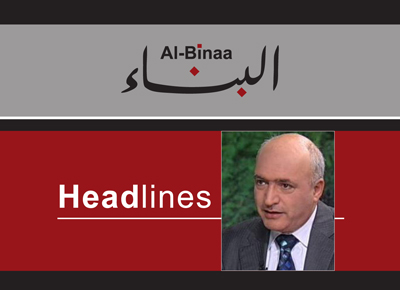The Largest Million-Man Rally in Lebanon Against Israeli Warplanes: On Your Oath, Nasrallah / Qassem: Behind the State in Liberating Occupied Lands and Repelling Aggression… and the Resistance Is Strong
We Will Help Build a Strong and Just State Under the Taif Agreement… and Lebanon Is a Final Homeland

February 24, 2025
The political editor wrote
Hezbollah has shattered the hopes and expectations of its adversaries, who had dreamed of seeing a rally unlike its past gatherings – one that could be used as proof that the party no longer enjoys the same popular support. They had hoped that, after being forced to scale back its military role and adapt to new realities, Hezbollah would also have to come to terms with its supposed political and popular decline. Their vision rested on the idea that Hezbollah would be compelled to accept a lifeline from its opponents – trading its weapons for a continued political role and the unblocking of reconstruction efforts, regardless of whether diplomatic efforts to liberate occupied Lebanese land and stop Israeli aggression had any real chance of success.
But the unprecedented million-man rally in Lebanon sent a resounding message: Hezbollah did not merely replicate its past demonstrations, it surpassed them many times over. The martyrdom of its two senior leaders only strengthened its resolve and reinforced its popular base’s unity and commitment to the path of resistance. This was made clear when Israeli warplanes attempted to intimidate the crowds by flying low over the Sports City Stadium, only to be met with a thunderous chant: “On your oath, Nasrallah!” – an echo of the call raised by Hezbollah’s Deputy Secretary-General, Sheikh Naim Qassem.
Just as Hezbollah demonstrated meticulous organisation and full control over managing the massive crowd, including a large number of political and media figures from inside and outside Lebanon – it also succeeded in reframing its current military restraint. Instead of being interpreted as weakness or defeat, it was presented as a strategic choice that prioritises investment in the role of the state.
In his speech, Sheikh Qassem focused on two key themes: the occupation, the state, and the resistance on one hand, and national partnership and the state-building project on the other. On the first theme, he stated:
“We have now entered a new phase – one with different tools, methods, and ways of engagement. The most significant step we have taken is ensuring that the state assumes its responsibility after the resistance prevented the enemy from achieving its goals. We accomplished the first part of our mission, and now comes the second part – the responsibility of the state. We upheld our commitments, while Israel did not and will not. We exercised patience, giving diplomacy and negotiations the chance to facilitate an Israeli withdrawal. We did not violate the agreement, so as not to be equated with the enemy. But now, with the deadline for withdrawal expired, we are no longer dealing with mere Israeli violations; we are facing outright occupation and aggression. Whether it’s one point, five points, or any other area, it is occupation and aggression. Bombing Lebanese territory under any pretext is aggression. Israel cannot continue its occupation and attacks. Let it be known: the resistance remains present and strong, in numbers, in arms, and in its people”.
On the second theme, Sheikh Qassem affirmed: “We will take part in building a strong and just state, contributing to its revival based on equality among citizens in rights and duties, under the framework of the Taif Agreement, and through three fundamental pillars:
First: Expelling the occupier and securing the release of detainees.
Second: Rebuilding and restoring infrastructure as a fundamental obligation of the state, which we fully support. Third: implementing an urgent rescue plan for economic, financial, administrative, judicial, and social recovery.
Fourth: we are committed to inclusive participation in state-building, to national unity, and to civil peace.
And let me make it clear: for us, Lebanon is a final homeland for all its people, and we are among its people”.




